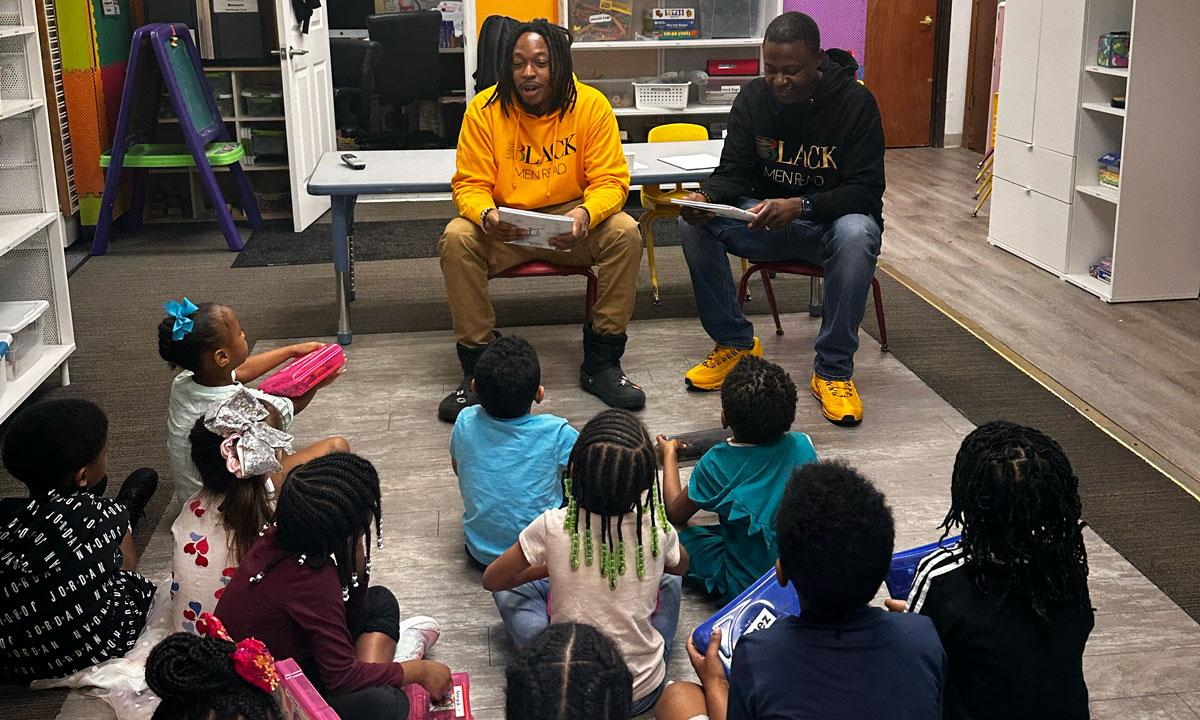How One St. Louis Literacy Org Helps Black Students Become Proficient Readers
11% of Black students in the city public schools read at grade level. Black Men Read is working to change that with tutoring, summer reading camp.

Get stories like this delivered straight to your inbox. Sign up for The 74 Newsletter
What began as a virtual book club for Black St. Louis men to maintain community at the start of the pandemic has now transformed into an organization dedicated to combating the city’s youth literacy crisis.
Black Men Read was founded by Keyon Watkins in 2020. The club originally consisted of Watkins and about 15 of his friends meeting on Facetime or Zoom to discuss books like The Art of War and The Four Agreements. But when tragedy struck his family on Mother’s Day two years later, Watkins knew he wanted to do more.
On May 8, 2022, Watkins’s brother Damon Hawkins was fatally shot in a parking lot.
“My older brother was very intelligent,” Watkins said. “However, he couldn’t read. When you can’t read, you have limited options in life. What could the trajectory of his life have been if he knew how to read?”
Because his brother couldn’t read, he didn’t graduate from high school. Watkins, his mother and his niece helped Hawkins fill out job applications, but Hawkins’s lack of literacy, Watkins said, limited his options for jobs, as well as housing. Watkins described the area where his brother lived as “terrible.” He was killed by one of his neighbors.
Watkins said his brother’s death motivated him to advocate against gun violence and expand Black Men Read to become a nonprofit that could help young children improve their literacy.
St. Louis has struggled for years to raise reading proficiency for its students. As of 2021, only 11% of K-12 Black public school students in the city were proficient readers, in comparison to 55% of white students.
Research shows that third graders who aren’t proficient in reading by the end of the school year are four times less likely to graduate from high school than students who are. In 2021, only 89 of 1,149 Black third graders in St. Louis public schools scored as proficient or advanced in English Language Arts.
Missouri passed a law in 2022 to require schools to focus on science of reading strategies to improve literacy. But Watkins and other community members aren’t waiting.
In 2022, his organization worked with Head Start programs to read to preschoolers. Soon after volunteering with Head Start, he and eight members of the group began reaching out to members of the community who might be interested in tutoring older students.The organization volunteered twice a week at Barack Obama Elementary School for the second half of the 2023-24 school year. Its members worked with 15 students in first to fifth grade after school and hope to expand to more schools in the Normandy School District soon.
Tutors are required to pass a background screening and undergo training. They worked with Webster University to receive proper tutoring training and used techniques from the University of Florida Literacy Institute, which teaches linguistic and reading comprehension, to guide their lessons. Watkins hopes to offer this training for parents in the future so they can implement these methods at home.
The organization also made a concerted effort to maintain enthusiasm around reading throughout the summer. In June, Black Men Read launched a summer reading program at the First Baptist Church of Meacham Park’s education center. It is hosting about 30 kids on Wednesdays and Thursdays for about 3½ hours. The program began with individual testing to assess each student’s reading level and includes one-on-one tutoring throughout the day.
Inline_story url=”https://www.the74million.org/article/amid-dismal-state-scores-kipp-st-louis-changes-course-on-reading/”]
“We focus on phonics and sight words. We also have flashcards that will have a story with no words, just pictures so they can visually arrange what happens, first, second and third, to help with reading comprehension. We try to make it fun. We have sight word bingo and crossword puzzles to keep them engaged,” Watkins said.
The summer program includes other activities like slime making and guided workouts from a physical trainer. Black Men Read also partnered with another local organization called Ready Readers to provide each child with a book to take home.
With the school year approaching, two of the biggest challenges Watkins and his team are facing are finding enough volunteer tutors and financial assistance. He said the community has been supportive, but he is hoping to obtain grants soon.
Coalition With STL Kids, which works to “highlight the racist educational status quo,” according to its Instagram page, helps bolster Black Men Read’s literacy efforts while holding the local school board accountable for what it believes are low expectations for Black students.
“We know that poverty and all these things affect learning, and we have to do what we can to address it, but we also have to start with the belief that despite our kids’ challenges, they can succeed,” said coalition founder Chester Asher. “But the longer we persist in this sense of pity that all these poor children can’t do anything because of their struggle, we just enable and feed a cycle of poverty.”
Black Men Read and Coalition with STL Kids have partnered to recruit 100 new tutors. On Aug. 16, they will hold a training session for new tutors focused on the science of reading and the five pillars of literacy: phonemic awareness, phonics, fluency, vocabulary and comprehension.
Get stories like these delivered straight to your inbox. Sign up for The 74 Newsletter

;)
